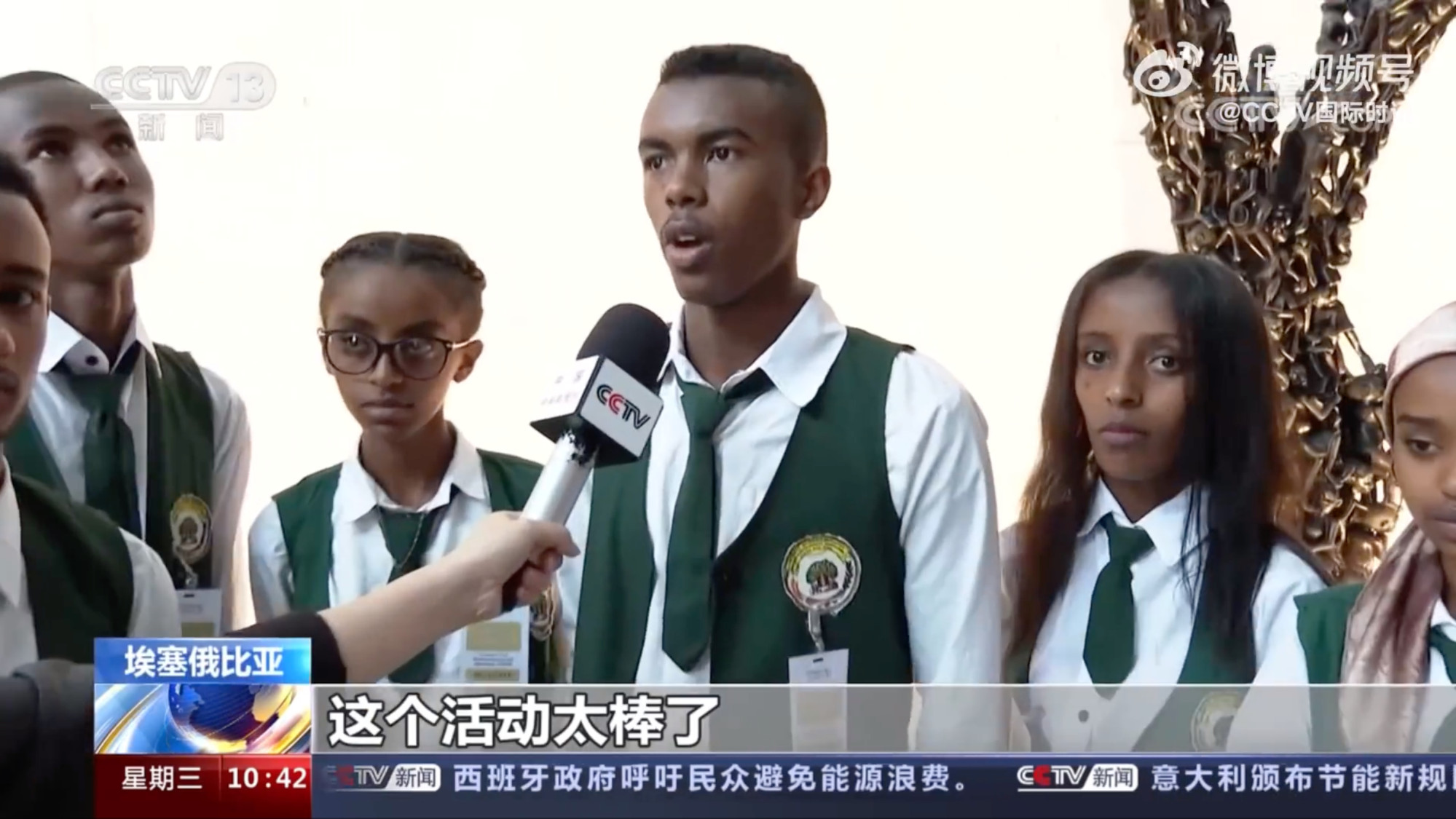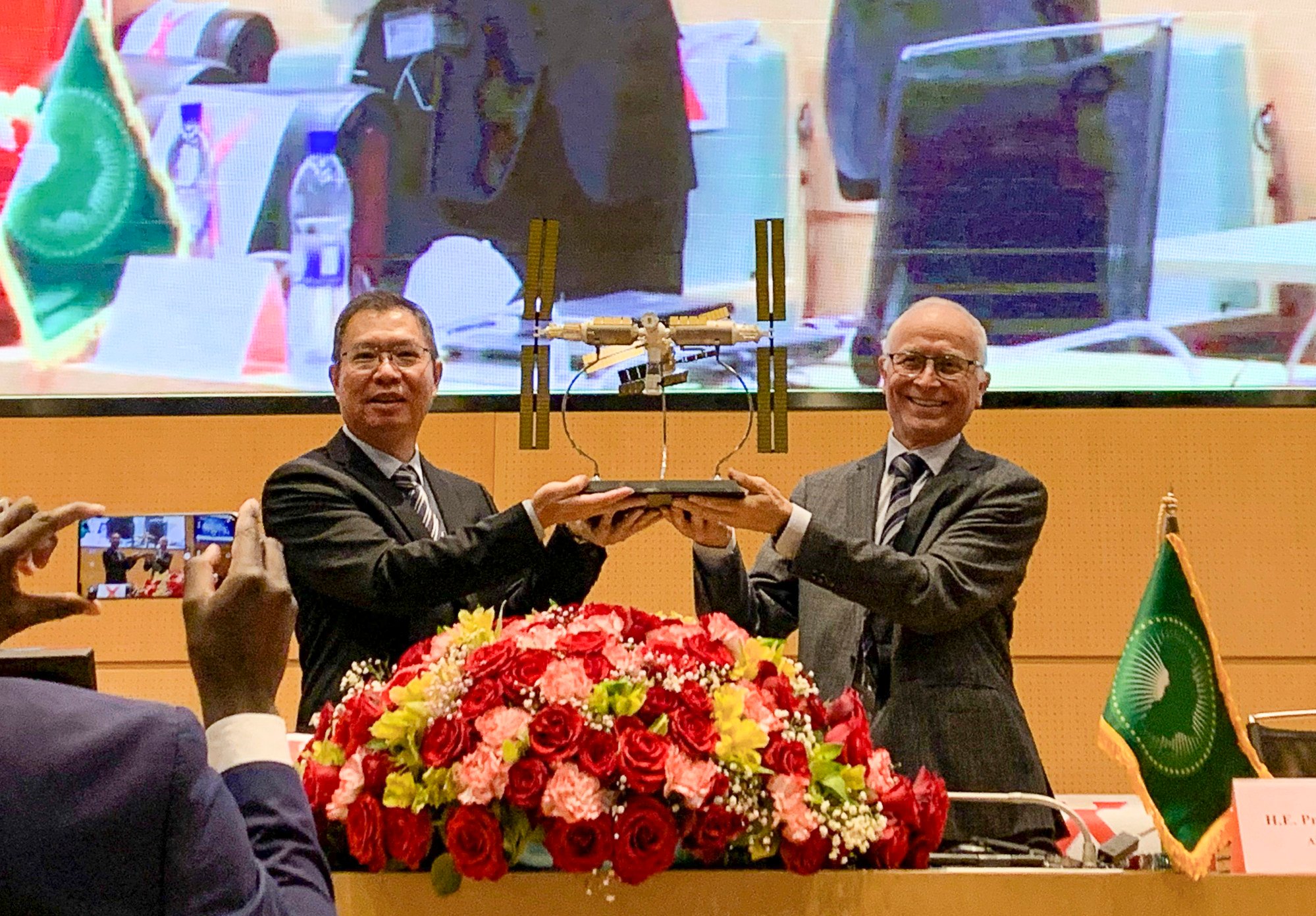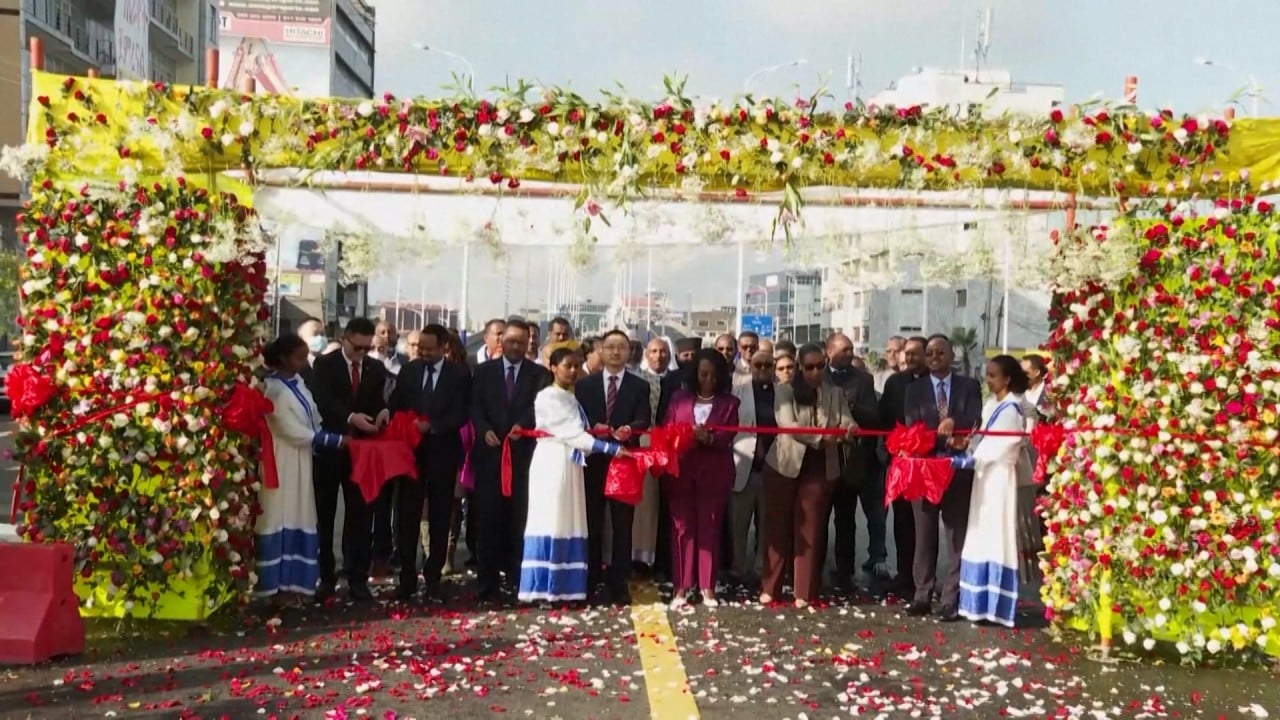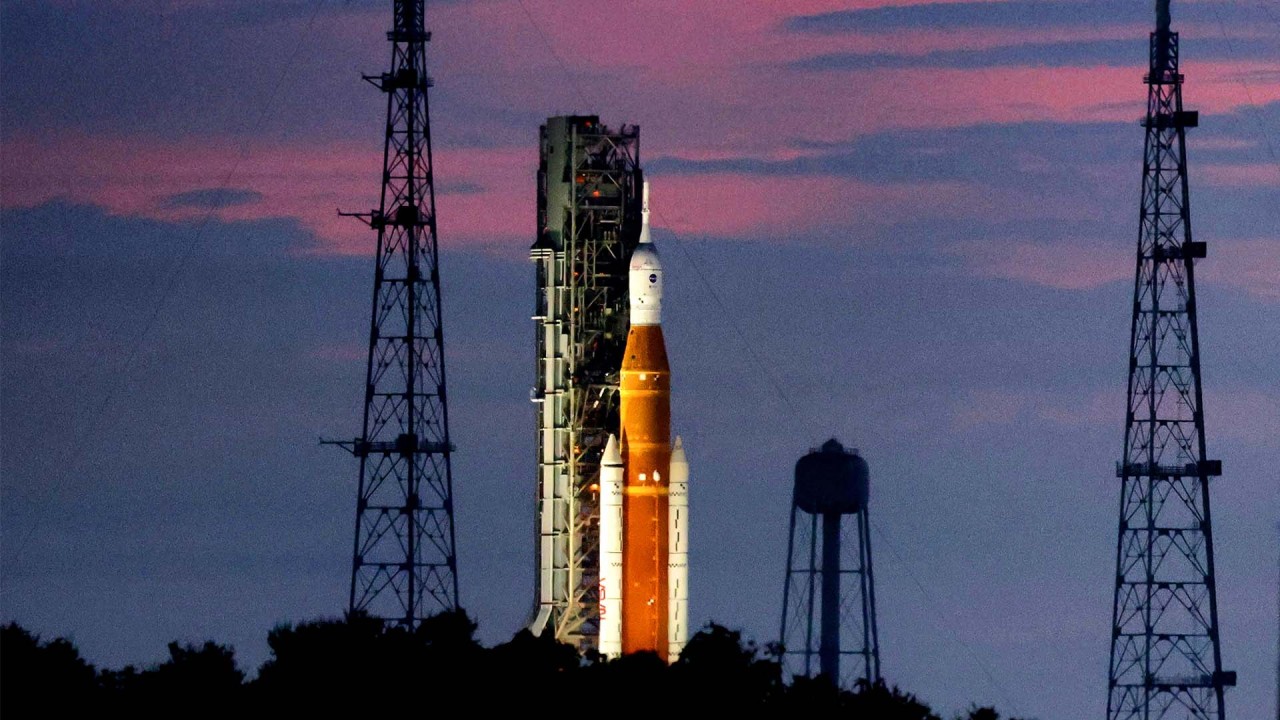
China aims to lift Africa’s space ambitions in drive to beat US domination
- Tiangong astronauts chat with students from eight African nations at event showcasing China’s advances in space science and soft power play
- Countries including Ethiopia, Algeria, Tunisia, Egypt and Namibia have already started their space journey with Chinese help, mission to AU notes
“China is willing to support African Union space initiatives and enhance our cooperation in that regard,” He Youlin, minister counsellor, said at an event where Chinese astronauts stationed in space connected with African youth from eight countries via video link.
Chen Dong, Liu Yang and Cai Xuzhe, who are on a six-month mission to China’s under-construction Tiangong space station, answered questions on issues ranging from their life in orbit to scientific experiments conducted aboard the spacecraft.
The event, held at the African Union headquarters in Addis Ababa, aimed to showcase China’s advances in space science as part of its soft power play in the continent.
Students from Algeria, Egypt, Ethiopia, Namibia, Nigeria, Senegal, Somalia and South Africa took part in the proceedings virtually from their respective Chinese embassies.
China’s new rocket engine, twice as powerful as US’, is ‘complete success’
On a clear day, astronauts can spot the Sahara – the world’s largest hot desert – or Mount Kilimanjaro – Africa’s tallest mountain, through portholes on the Tiangong spacecraft, the students heard.
“We can also see some big cities, particularly at night, brightly-lit cities are easy to see,” the astronauts said in response to a question from an Algerian student.
Tuesday’s event was co-hosted by the Mission of China to the AU, the AU Commission and the China Manned Space Agency, which operates the Tiangong space station in low-Earth orbit, between 340 and 450km (210 and 280 miles) above the planet’s surface.
Chen, Liu and Cai were sent into orbit on the Shenzhou 14 mission in June to help assemble the space station.
With no interference from the Earth’s atmosphere and clouds, even the moon is “clearer and brighter when viewed from the space station”, the astronauts said. “We also have a clear view of the starry sky and the vast universe.”

“When the sun rises in space, we first see a golden arc on the edge of the Earth, and soon there is glaring sunlight [lighting up the globe],” said Liu, who became the first Chinese woman to go to space, as part of the crew of the 2012 Shenzhou-9 mission.
“Against the deep darkness of space, the Earth is magnificent, the seawater is as blue as cornflowers and the clouds are as white as snow,” Liu said.
A student from Namibia asked about the research the trio were conducting on their mission.
Cai said the focus was on studying the impact of long-term exposure to zero gravity on astronauts’ health and corresponding protection measures, as well as gauging their capabilities and delving into the application of traditional medicine in space.
“[We] also do experiments on variable gravity science, life and ecology science, biotechnology science, physics of fluids and combustion science,” Cai added.
China’s first woman in space returns as part of Shenzhou 14 mission
In terms of funding and space activities, the US through Nasa is the biggest player in the world but countries such as Russia, China and some European nations under the European Space Agency have made inroads into space science.
Namibia is among African countries to have benefited from Chinese-funded space activity. Last year, three Chinese astronauts on a Shenzhou-12 spaceship carried a Namibian national flag into space to highlight their cooperation, while two of the Tiangong astronauts, Cheng and Liu, visited Namibia in 2019 to engage with students.
Yang Jun, charge d’affaires of the Chinese embassy in Namibia, said China will offer training on space technology and conduct joint space research with the southern African country.
Dr Lin Xiqiang, deputy director general of the Chinese Manned Space Agency, said the aim is to complete building the Tiangong space station by the end of this year.
“Our [completed] space station will have resident astronauts and will have more than 20 laboratories that will enable scientific experiments on medicine, space life science, biotechnology, and material science,” he told the audience via video link.
Hu Changchun, head of China’s mission to the AU, said the chat with astronauts would help “stimulate the curiosity of African youth about space and their thirst for knowledge”.
“We have seen fruitful cooperation on satellite launches, construction of aerospace infrastructure as well as sharing of satellite resources, and joint research and development of satellites,” Hu said at the AU headquarters in the Ethiopian capital Addis Ababa.
China had also provided training for African researchers in space technologies, he noted.
The Chinese mission video said remote sensing data had helped China cooperate with Africa on disaster prevention and mitigation, radio astronomy, satellite navigation and precision agriculture.
A complete satellite assembly integration and test centre built by Egypt with Chinese help had laid a solid foundation for the country’s aerospace industry, it said.
China also assisted Algeria in launching its first-ever communication satellite and has completed the in-orbit delivery of Sudan’s first scientific experiment satellite.
In addition, China has increased its BeiDou positioning system’s global service capacity by establishing a related cooperation mechanism with the African Union, the video said. Setting up of the first overseas BeiDou centre in Tunisia is complete, and satellite navigation cooperation is ongoing with countries including South Africa and Algeria.

Mohammed Belhocine, the AU commissioner for education, science, technology and innovation, said the Africa Space Agency headquartered in Egypt will be operational soon, taking the continent’s space ambitions forward as the union intended.
The AU is also finalising details with the South African government on setting up a Panafrican Universities Space Science Institute.
The AU Commission’s cooperation mechanism with the China National Space Administration and the related Chinese private sector was established in 2019, he said, with work visits culminating in last year’s draft China-Africa Space Policy white paper addressing the key objectives and priorities.
Last year’s China-Africa BeiDou Forum was an example of mutual space cooperation, Belhocine said. “China has also worked with African countries to develop ground infrastructure and experimented with six launches,” he pointed out.
According to Nigerian space scientist Temidayo Oniosun, “the space industry in Africa is growing at an incredible rate. Hence, countries and regions like China, Europe, Russia and the US are beginning to compete for a stake in the industry”.
The African space economy in 2021 was valued at US$19.49 billion and projected to grow by 16.16 per cent to US$22.64 billion by 2026, employing over 19,000 people across the continent, he said.
“Space is a critical tool for facilitating international diplomacy between China and African countries as it is also a catalyst for economic growth, addressing development challenges and national security,” said Oniosun, who is also managing director of Space in Africa, a media, analytics and consulting company focused on the African space and satellite industry.
He said most satellite projects in Africa are funded by African institutions via a range of financing mechanisms, with about US$4.5 billion spent so far on acquiring and manufacturing satellite technologies. About US$871.5 million worth of contracts went to China and US$2.6 billion went to France, while US$587 million went to Russia, US$101 million to the United Kingdom and US$250 million to the United States, he said.




